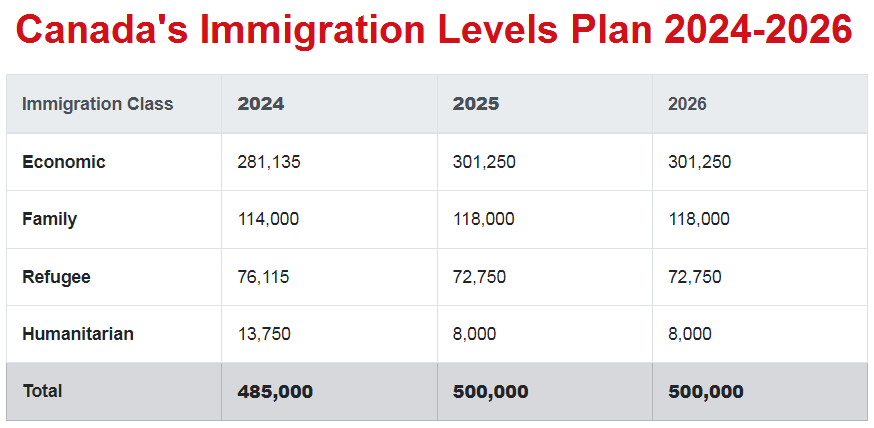Canada’s Immigration Plan 2024-2026: Each year, the federal department of Immigration, Refugees and Citizenship Canada (IRCC) releases a new Immigration Levels Plan which it uses to guide its operations. There is a turning point in Canada’s commitment to migrants as the IRCC recently published its ambitious immigration strategy for the years 2024 to 2026. We’ll learn the new immigration plan for Canada in 2024-2026, the 5-year PGWP (Postgraduate Work Permit), the restoration of temporary residence to permanent residence, and other significant improvements in this guide.
Canada welcomes high levels of immigration to keep its economy strong. Canada has been increasing its immigration levels since the late 1980s to increase its rate of population, labour force, and economic growth. Canada now depends on immigration for the majority of its population and labour force growth and a larger share of its economic growth. Canada has regularly welcomed over 200,000 immigrants per year since 1988. In recent years, it has decided to increase its levels to well over 400,000 per year. Canada’s immigration rate now stands at nearly 1.2 per cent. In other words, Canada welcomes three times more immigrants on a per capita basis than then the United States of America.
Canada unveiled its new immigration plan, which includes a 5-year PGWP and the reintroduction of temporary residence to PR. Canada’s Minister of Immigration, Mark Miller, recently made an intriguing announcement about Canada’s new immigration laws. Under its Immigration Levels Plan, Canada is now looking to welcome 500,000 new immigrants annually in the coming years, which are the highest levels in its history.
Canada’s 3 Major Visa Changes for 2024-2026
Below are three significant changes that will impact migrants in 2024-2026.
- Standardized Visa Processing Time
The first major change to Canada’s immigration regulations is the establishment of a uniform processing period for visas. In the past, when candidates submitted to Canada for any type of application, work permit, study permit, tourist visa, or otherwise, they were usually given an estimated processing time.
The time frame for processing your application was a rough estimate of when you may expect a response. With the new approach, Canada now expects to shorten and speed up these processing times.
Furthermore, the government of Canada wants to make this even more predictable and effective. This is a change that everyone applying for a Canadian visa should be aware of since it ensures that your applications will be processed quickly.
For instance, in contrast to previous processing times when obtaining a work permit often took two or three months, work permits are now provided after just one month of application.
- Immigration plan for the next three years
Another significant statement relates to Canada’s immigration plan for the next few years. The plan lays out the country’s immigration objectives with the aim of bringing in a sizable number of newcomers over the next three years, given that Canada anticipates attracting over 485,000 immigrants in 2024.
Canada intends to accept 500,000 immigrants in 2025 and 2026 with even larger aspirations. Canada is thinking of bringing back the temporary resident to permanent resident’s immigration track in order to achieve these goals.
A very effective program called TR to PR enables temporary residents to become permanent residents. This suggests that this initiative, which is a component of the country’s immigration policy, may get increased attention over the course of the following three years.
- Extended Postgraduate Work Permit, PGWP
The much await and well-received extension of the postgraduate work permit to a maximum of 5 years is an important step. As of right now, the duration of your PGWP is directly related with the length of your study program. If you completed a one-year course, for instance, you would receive a one-year work visa.
Similarly, if you completed a two-year program, your work visa would be good for three years.
Many Canadians are supporting a petition that is now making the rounds in support of prolonging the PGWP’s existence. Students who complete the shorter, one-year program will be given a two-year PGWP, which will be subsequently extended for the duration of their study program.
In response to the petition, Minister Mark Miller stated that the government is considering the concept carefully. This consideration will likely result in the creation of a pool of suitable occupations, and if your studies are in an area connected to these vocations, you may be eligible for a PGWP of up to five years.
This change aims to meet the needs of Canada’s labor market and alleviate shortages in specific industries. Recent changes to Canada’s immigration regulations aim to extend work permits to international students and streamline the application process.
Additionally, it will open the door for the country to welcome even more immigrants. And as a potential student or immigrant, you must stay informed about these changes in order to plan your trip to Canada. Prospects for those looking to move to Canada appear more favorable than ever, and Canada is demonstrating its dedication to diversity and inclusiveness.
Summary of Canada’s Immigration Levels Plan 2024-2026
In 2023, Immigration, Refugees and Citizenship Canada (IRCC) plans to welcome more than 465,000 immigrants to Canada. In 2024, Canada’s newcomer target is 485,000 new permanent residents (PRs). In both 2025, and 2026 Canada will aim to welcome an additional 500,000 immigrants (in each year). The following table summarises Canada’s immigration targets between 2024-2026 by immigration class:

That will be all in this guide, Canada Immigration Plan 2024-2026, Canada’s 3 Major Visa Changes.
DISCLAIMER: Neither a government agency nor an immigration lawyer owns this site. The content on this site was gathered through research from various public domains for informative purposes. For your unique immigration needs, kindly consult an expert immigration lawyer.
 Jobsscholar Jobs Search | Education Hub | Scholars Portal
Jobsscholar Jobs Search | Education Hub | Scholars Portal